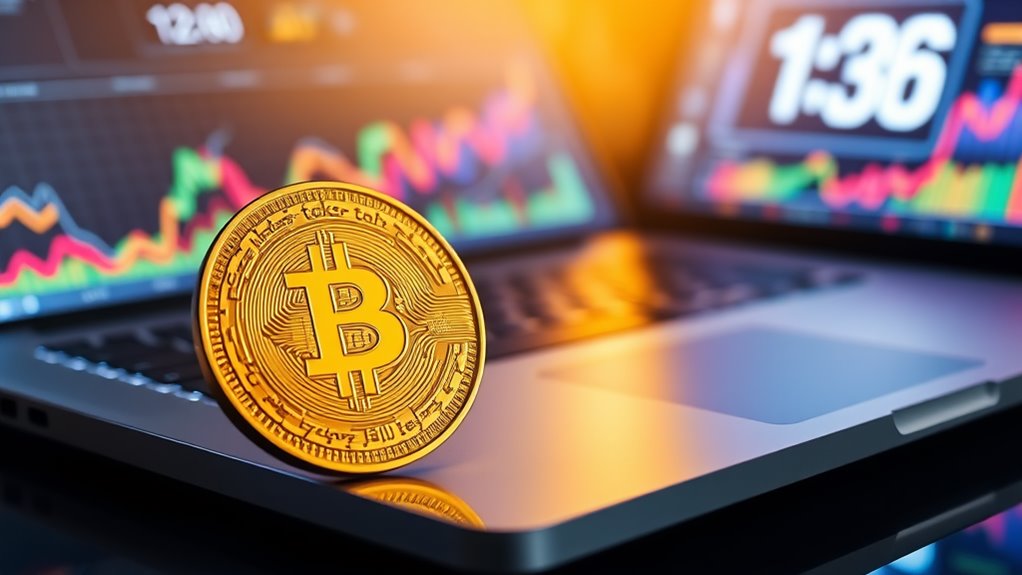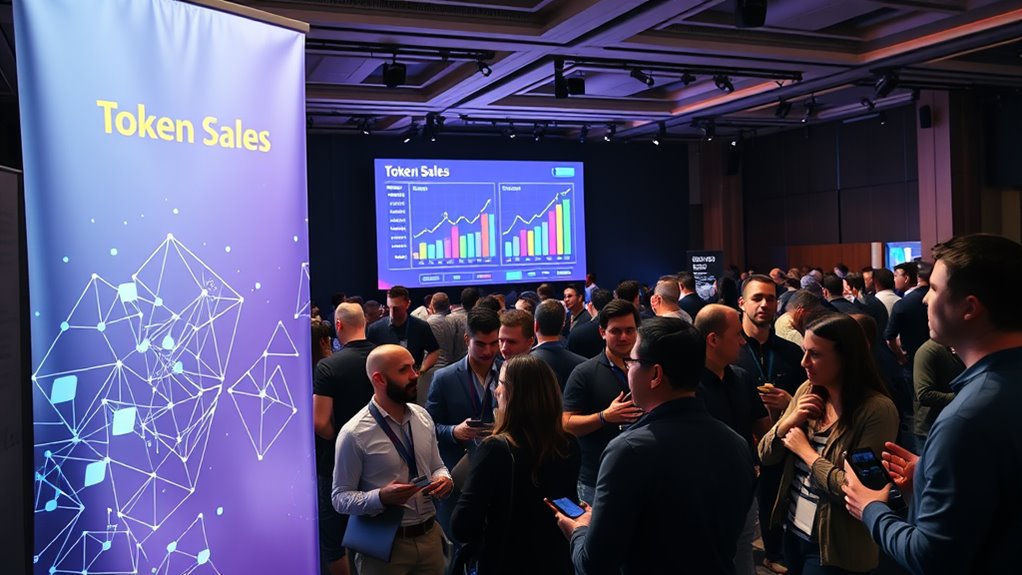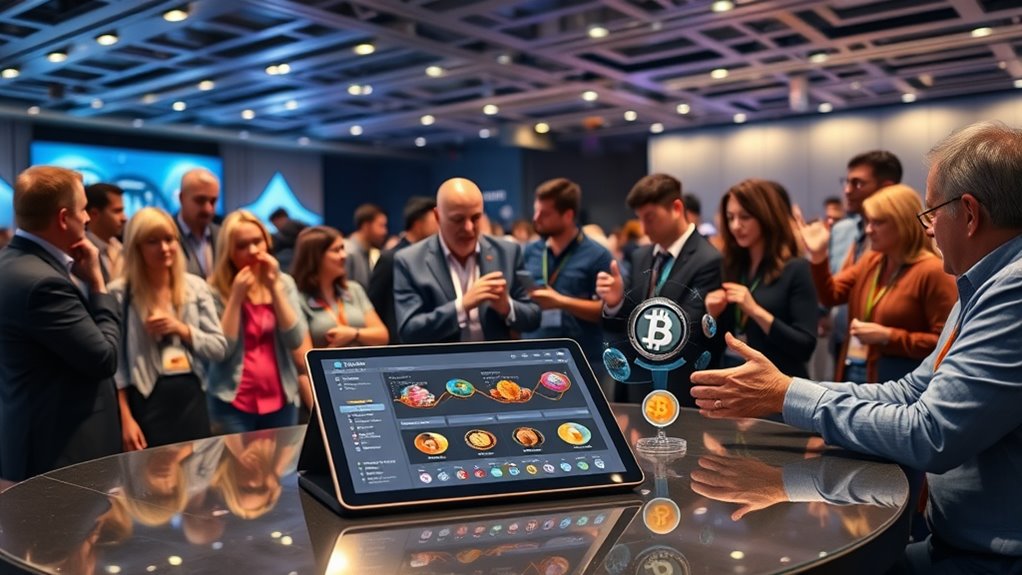
Token Sale: What Are They and How Do They Work?
Token sales, or Initial Coin Offerings (ICOs), are modern methods for blockchain projects to raise funds. They involve selling tokens that can represent ownership, voting rights, or profit shares in the project. Token sales allow broader participation and often bypass traditional financing methods. Various types exist, including ICOs, Security Token Offerings (STOs), and Initial Exchange Offerings (IEOs). Compliance with regulations and effective community engagement are essential for success. Exploring the types and benefits can provide deeper insights.
Key Takeaways
- Token sales, or ICOs, are fundraising methods for blockchain projects, allowing investors to buy tokens before the project’s launch.
- Types of token sales include ICOs, STOs, IEOs, TGEs, and Dutch auctions, each with distinct characteristics and regulatory considerations.
- Successful token sales rely on strong project fundamentals, clear use cases, and effective marketing strategies to attract investors.
- Transparency, community engagement, and compliance with regulations are essential to mitigate risks and build trust with participants.
- Smart contracts facilitate secure transactions and transparency during token sales, enhancing overall credibility in the fundraising process.
Understanding Token Sales

Token sales, often referred to as Initial Coin Offerings (ICOs), represent a modern fundraising method that allows projects to create and distribute blockchain tokens.
The main purpose of token sales is to secure funding while engaging the community and encouraging participation in the project’s ecosystem. Tokens can symbolize various rights, such as ownership, voting power, or a share in future profits.
Token sales aim to raise capital while fostering community engagement and granting various rights to token holders.
As an alternative to traditional fundraising, token sales enable direct participation from a broader audience, democratizing investment opportunities.
However, they are subject to both international and local regulations, which help guarantee compliance and mitigate legal risks. Thorough research is essential for potential investors to navigate the risks associated with ICOs effectively.
Understanding these fundamentals is vital for potential investors and projects considering this innovative fundraising approach.
Types of Token Sales

When exploring the various fundraising methods in the blockchain space, one discovers that different types of token sales cater to diverse project needs and investor preferences.
Initial Coin Offerings (ICOs) allow projects to sell new tokens before their launch, similar to traditional IPOs.
Security Token Offerings (STOs) represent ownership in assets and follow regulatory guidelines.
Initial Exchange Offerings (IEOs) occur on cryptocurrency exchanges, enhancing security and credibility.
Token Generation Events (TGEs) focus on generating and distributing tokens, often viewed interchangeably with ICOs.
Dutch Auction-based Token Sales utilize price discovery mechanisms to adjust token prices according to demand.
Each type serves specific goals, providing opportunities for both investors and projects in the evolving blockchain landscape. Additionally, the advantages and risks associated with each fundraising model can significantly impact the success of a project and the security of investor funds.
Purpose and Benefits of Token Sales

Token sales serve as a significant mechanism for capital raising, allowing projects to gather funds from a global audience without traditional financial barriers.
In addition to financial benefits, these sales foster community engagement, enabling investors to participate in governance and decision-making processes.
This dual purpose of fundraising and community building positions token sales as an essential strategy in the evolving landscape of project development. Moreover, conducting thorough research on ICO projects is vital to avoid potential risks such as scams or lack of oversight.
Capital Raising Opportunities
In recent years, numerous businesses have turned to token sales as a viable method for raising capital. This approach offers several advantages that can enhance a company’s fundraising efforts:
- Increased Access to Capital: Engages both retail and institutional investors.
- Global Accessibility: Leverages blockchain technology to reach a worldwide audience.
- Liquidity and Marketability: Allows tokens to be traded on exchanges, providing quick exits for investors.
- Innovation and Strategic Flexibility: Enables the design of tokens tailored to specific business models.
- Cost Efficiency: Reduces expenses related to traditional fundraising methods.
These factors contribute to the growing popularity of token sales, allowing businesses to connect with a diverse group of investors while maintaining flexibility and innovation in their offerings. Additionally, the unregulated nature of ICOs allows startups to bypass traditional financing routes, which can be time-consuming and restrictive.
Community Engagement Strategies
Successful capital raising through token sales not only relies on financial incentives but also on the active participation and engagement of the community surrounding the project.
Utilizing social media platforms like Twitter and Reddit helps to maintain a strong online presence, while dedicated messaging channels on Telegram and Discord facilitate direct communication.
Hosting community events, webinars, and Q&A sessions fosters trust and interaction among participants. Post-sale, reward systems and exclusive access for token holders encourage continued involvement.
Transparent communication through newsletters and real-time updates keeps the community informed. Educational resources clarify the token’s utility, while decentralized governance empowers members in decision-making.
Additionally, the use of smart contracts in IDOs enhances the credibility of the fundraising process by ensuring transparency and efficiency.
Ultimately, these strategies build a loyal community that advocates for the project and supports its long-term success.
How Token Sales Operate

When a blockchain project seeks to raise funds, it typically turns to a token sale as a viable option. Token sales function as fundraising mechanisms where tokens are exchanged for existing cryptocurrencies.
These sales generally follow a structured process, including:
- Detailed preparation with a whitepaper and clear tokenomics
- Creation and allocation of tokens, retaining a portion for the development team
- Compliance with legal requirements, such as securities laws
- Marketing strategies that engage potential investors through various platforms
- Execution through smart contracts to guarantee secure transactions
Post-sale, tokens may be traded on exchanges, and the project team focuses on development and ongoing token management. A well-crafted whitepaper is essential for generating buzz and securing investment, as it outlines a project’s goals and highlights its viability and potential for growth.
This structured approach aims to facilitate transparency and trust in the fundraising process.
Impact of Token Sales on the Market

The impact of token sales on the market is significant, as these fundraising mechanisms have transformed the way projects secure capital and engage with investors.
Token sales introduce heightened market volatility, driven by speculation and rapid price fluctuations. As tokens can lose value quickly, there is a risk of them dropping to zero if projects fail.
The decentralized nature of token sales fosters global participation, enabling investors from various locations to access opportunities traditionally limited to venture capital.
The decentralized nature of token sales opens doors for global investors, democratizing access to opportunities once reserved for venture capital.
However, this also introduces regulatory challenges, as the legal status of tokens varies by jurisdiction. Additionally, investors face risks of fraud and cybersecurity issues, as token sales lack the assurances typically associated with traditional funding methods, leading to potential market instability. Conducting thorough research can help mitigate these risks and protect investors from potential scams.
Notable Examples of Successful Token Sales

Token sales have emerged as a pivotal fundraising mechanism in the blockchain ecosystem, showcasing a variety of successful projects that have captured considerable investor interest.
Notable examples include:
- Ethereum ICO: Raised $18 million in 2014, facilitating decentralized applications and smart contracts.
- EOS Token Sale: Collected a record $4 billion between 2017 and 2018, emphasizing scalability in blockchain.
- NEO ICO: Conducted in 2016, it greatly benefited investors through its focus on decentralized assets.
- Gate.io IEO: Secured $83 million in 2019, marking a successful entry in the Initial Exchange Offering space.
- Polygon IEO: Experienced substantial price growth post-sale, enhancing its reputation in the market.
These examples illustrate the diverse approaches and successful outcomes that token sales can achieve in the evolving blockchain landscape. As the industry matures, token sales are expected to see deeper integration with DeFi, enhancing accessibility and security for investors.
Frequently Asked Questions
How Can I Participate in a Token Sale?
To participate in a token sale, individuals must register on a platform, complete identity verification, guarantee a sufficient cryptocurrency balance, and follow specific investment guidelines, including minimum amounts and transaction fees, if applicable.
What Is the Difference Between a Utility and Security Token?
The difference between utility and security tokens lies in their purpose; utility tokens grant access to services within ecosystems, while security tokens represent ownership in real-world assets, subject to stricter regulatory requirements and legal rights.
Are Token Sales Legal in My Country?
The legality of token sales varies by country. Each jurisdiction has specific regulations, often based on the classification of tokens as securities, necessitating careful consideration of local laws to guarantee compliance before participation.
How Do I Evaluate the Potential of a Token Sale?
Evaluating a token sale’s potential seems straightforward, yet it demands discerning analysis of fundamentals, tokenomics, market dynamics, and risks. Ultimately, one must navigate the complexities to uncover genuine opportunities amidst the noise of inflated promises.
What Should I Do if a Token Sale Project Fails?
If a token sale project fails, stakeholders should prioritize managing legal disputes, evaluating financial reserves for refunds, and implementing reputation repair strategies while ensuring compliance to rebuild trust and prepare for future opportunities.
Conclusion
To summarize, token sales stand as a bridge connecting innovation and investment within the cryptocurrency landscape. By understanding their types, purposes, and operational structures, individuals can navigate this complex arena with greater confidence. The impact of token sales on the market reflects their growing significance, while successful examples illustrate their potential for transformative change. As the digital economy evolves, token sales will likely continue to play a pivotal role in shaping the future of finance and technology.














